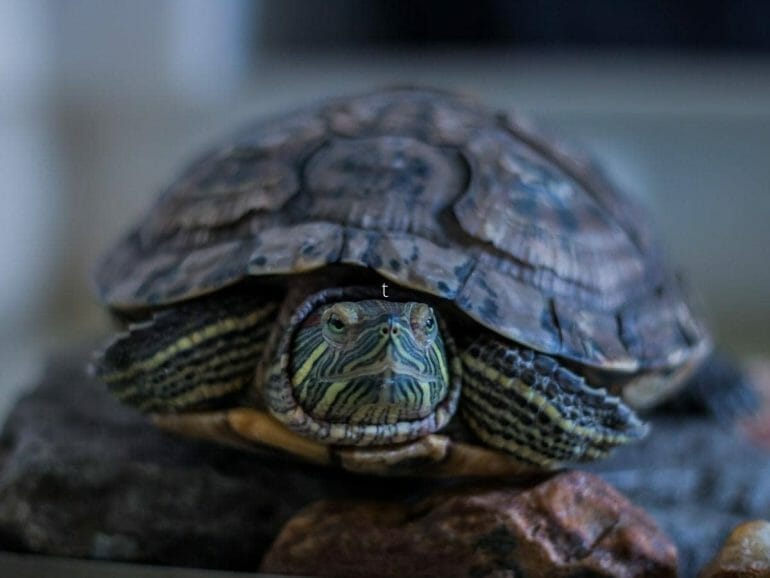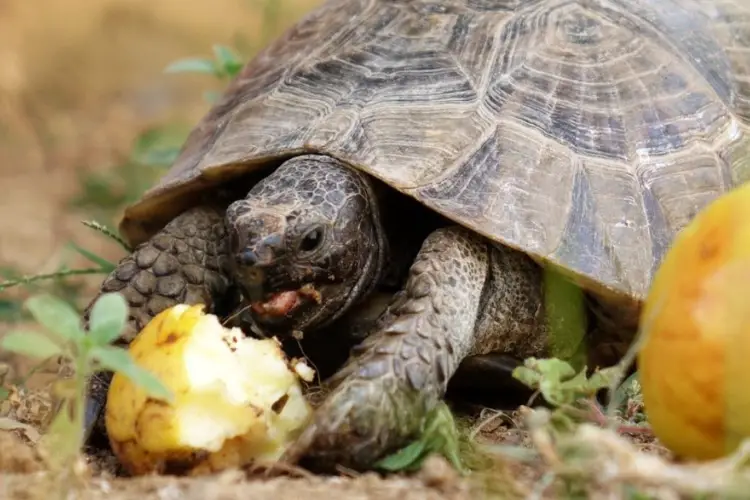Turtles are primarily herbivorous creatures that thrive on a diet encompassing fruits, vegetables, and aquatic plants. While tortillas may seem harmless, they are not a natural or recommended part of a turtle’s diet. Turtles have specific nutritional requirements and consuming tortillas could potentially lead to digestive issues and nutritional imbalances. It is crucial to provide turtles with a well-rounded and species-appropriate diet to ensure their optimal health and well-being.

The Impact of Tortillas on Turtle Health: What You Need to Know
Tortillas are a popular food item enjoyed by many people around the world. However, it is important to understand the potential impact that tortillas can have on turtle health. In this section, we will explore the effects of tortilla consumption on turtles and provide you with key information to ensure the well-being of these fascinating creatures.
The Dangers of Tortilla Feeding
Turtles are naturally omnivorous creatures and have a diverse diet that includes a variety of plants, insects, and small aquatic animals. While they may occasionally consume plant-based products in the wild, such as fruits or vegetables, it is important to note that tortillas are not a natural part of their diet. Feeding tortillas to turtles can have negative consequences for their health.
One of the main issues with feeding tortillas to turtles is their high carbohydrate content. Tortillas are typically made from refined grains, which are quickly broken down into sugars by the body. Turtles are not adapted to digest this high amount of carbohydrates and it can lead to weight gain, obesity, and other related health problems.
Furthermore, tortillas often contain added ingredients such as salt, spices, or oils, which can be harmful to turtles. These additives can disrupt the delicate balance of their digestive system and lead to gastrointestinal issues. Additionally, the high salt content in tortillas can cause dehydration in turtles, as they require a specific level of salinity in their environment.
Alternatives to Tortilla Feeding
If you want to provide your pet turtles with a healthy and balanced diet, it is best to avoid feeding them tortillas altogether. Instead, focus on offering food items that are more suitable for their dietary needs. Here are some alternatives to consider:
- Leafy Greens: Turtles thrive on a diet rich in leafy greens such as kale, spinach, and lettuce. These vegetables provide essential nutrients and are low in carbohydrates.
- Protein Sources: Offer your turtles protein-rich foods such as insects, worms, or commercially available turtle pellets. These sources provide the necessary protein for growth and development.
- Fruits and Vegetables: While turtles should not rely solely on fruits and vegetables, these can be offered as occasional treats. Opt for turtle-safe options like berries, melons, or carrots.
Monitoring Turtle Health
Regular monitoring of your turtles’ health is essential to ensure their well-being. Look out for signs of weight gain or loss, unusual behavior, or changes in appetite, as these can indicate potential health issues. If you notice any concerns, consult a veterinarian who specializes in reptiles.
In summary, while tortillas may be a tasty and convenient food item for humans, they are not suitable for turtle consumption. Feeding turtles tortillas can lead to health problems such as weight gain, digestive issues, and dehydration. Instead, focus on providing a balanced diet consisting of leafy greens, protein sources, and occasional fruits and vegetables. By making informed choices about their diet, you can contribute to the long and healthy life of these incredible creatures.

Alternative Food Options for Turtles: Beyond Tortillas
Turtles are fascinating creatures that require a balanced and nutrient-rich diet to thrive. While tortillas have long been a staple in the diet of pet turtles, it is important to explore other food options to ensure their health and well-being. In this section, we will discuss alternative food options for turtles that go beyond traditional tortillas.
1. Leafy Greens
Leafy greens are a fantastic addition to a turtle’s diet. They are packed with essential vitamins and minerals that promote a healthy immune system and overall well-being. Some excellent options include kale, collard greens, and dandelion greens. These greens can be offered raw or lightly steamed to make them more palatable for your turtle.
Pro Tip: Rotate between different leafy greens to provide a variety of nutrients and flavors for your turtle.
2. Vegetables
Adding a variety of vegetables to your turtle’s diet can provide additional nutrients and enrichment. Some recommended options include carrots, bell peppers, and squash. These vegetables can be grated or cut into small, bite-sized pieces to make them easier for your turtle to consume.
Pro Tip: Avoid feeding your turtle onions, garlic, and mushrooms, as they can be toxic to turtles.
3. Fruits
While fruits should be offered in moderation due to their high sugar content, they can be a tasty and nutritious treat for turtles. Some suitable fruits for turtles include berries, melons, and apples. Remember to remove any seeds or pits, as they can be harmful to your turtle.
Pro Tip: Offer fruits as a special treat or reward rather than a staple part of your turtle’s diet.
4. Protein Sources
Turtles require protein for growth and development. While tortillas can provide some protein, it is beneficial to incorporate other protein sources into their diet. Some options include insects, such as mealworms and crickets, as well as cooked fish or lean meats like chicken or turkey. Ensure that any protein source is properly prepared and free from seasoning or additives.
Pro Tip: Consider dusting insects with a calcium supplement to enhance your turtle’s calcium intake.
5. Commercial Turtle Food
Commercial turtle food can be a convenient option to ensure that your turtle’s nutritional needs are met. Look for high-quality turtle pellets or sticks that are specifically formulated for turtles. It is important to note that commercial food should not be the sole source of nutrition and should be supplemented with fresh foods.
Pro Tip: Soak commercial turtle food in water before offering it to your turtle to prevent potential digestive issues.
In summary, while tortillas have been a popular food option for turtles, it is essential to provide a varied and balanced diet for their overall health and well-being. Incorporate leafy greens, vegetables, fruits, protein sources, and commercial turtle food to ensure that your turtle receives all the necessary nutrients. Remember to consult a veterinarian for specific dietary recommendations based on your turtle’s species and individual needs.
Feeding Guidelines for Turtles: Ensuring a Balanced Diet
When it comes to keeping turtles as pets, providing them with a well-balanced diet is essential for their overall health and well-being. Turtles have specific dietary needs that must be met in order to thrive in captivity. In this section, we will discuss the feeding guidelines for turtles, including the types of food they should eat and the proper feeding techniques.
1. Understand the Nutritional Needs of Turtles
Before diving into the specifics of feeding turtles, it is important to understand their nutritional needs. Turtles are omnivorous creatures, meaning they require a combination of both plant and animal-based foods in their diet. This ensures that they receive all the necessary nutrients to support their growth and development.
The key nutrients that turtles require include:
- Protein: Turtles need a source of high-quality protein, which can be obtained from foods such as insects, fish, and lean meats.
- Fiber: Fiber is essential for proper digestion in turtles. It can be obtained from leafy greens, vegetables, and fruits.
- Calcium and Vitamin D3: Turtles need calcium for their shell and bone health. Vitamin D3 aids in calcium absorption. These nutrients can be provided through foods like calcium-rich vegetables and supplements.
- Vitamins and Minerals: Turtles also require a variety of vitamins and minerals for their overall health. These can be obtained through a well-rounded diet that includes a range of fruits, vegetables, and supplements.
2. Offer a Variety of Foods
Turtles benefit from a diverse diet that includes a variety of foods. This helps to ensure that they receive all the necessary nutrients. A typical turtle diet should include:
- Commercial Turtle Pellets: High-quality commercial turtle pellets are specially formulated to provide a balanced diet. These pellets should make up a significant portion of a turtle’s diet.
- Fresh Vegetables: Leafy greens such as kale, spinach, and collard greens should be offered daily. Other vegetables like carrots, squash, and bell peppers can also be included.
- Fruits: Occasional treats of fruits like strawberries, melons, and apples can be given to turtles. These should be offered in moderation due to their high sugar content.
- Protein Sources: Turtles require protein for growth and muscle development. Insects like crickets, mealworms, and earthworms can be offered as a source of protein. Fish and lean meats can also be included but should be given in smaller quantities.
- Calcium Supplements: To ensure proper shell and bone health, turtles may require calcium supplements. These can be in the form of calcium powder or cuttlebone, which can be provided a few times a week.
3. Feed According to the Turtle’s Age and Species
It is important to consider the age and species of your turtle when determining its feeding routine. Different turtle species have varying dietary requirements, and the amount of food needed may also change as turtles grow.
For hatchling turtles, their diet may consist mainly of commercial turtle pellets and small portions of protein sources. As they grow, their diet can be gradually expanded to include a wider variety of vegetables and protein sources.
Adult turtles require a more balanced diet that includes a mix of pellets, vegetables, and protein sources. However, the portion sizes should be adjusted to avoid overfeeding, which can lead to obesity and other health issues.
4. Provide Proper Feeding Techniques
When feeding turtles, it is important to follow some best practices to ensure they receive their food in a safe and healthy manner:
Use a Separate Feeding Container: It is recommended to use a separate container for feeding turtles to prevent them from ingesting substrate or contaminants from their enclosure.
Monitor Feeding Intake: Keep an eye on how much your turtle consumes during each feeding session. This helps in adjusting portion sizes and preventing overfeeding.
Remove Uneaten Food: Any food left uneaten after 15-20 minutes should be removed from the enclosure to prevent spoilage and water contamination.
Can turtles eat tortillas?
No, turtles should not eat tortillas. Tortillas are not a natural part of a turtle’s diet and can be difficult for them to digest properly. It’s important to feed turtles a balanced diet of foods that are specifically recommended for their species.
What should I feed my turtle?
Turtles have specific dietary needs depending on their species. It’s best to consult a reptile veterinarian or do research on the specific type of turtle you have to determine the appropriate diet. Generally, turtles need a mix of protein (such as insects or fish), fruits and vegetables, and commercial turtle pellets.
Can I feed my turtle fruits and vegetables?
Yes, many turtles can eat fruits and vegetables as part of their diet. However, it’s important to research the specific fruits and vegetables that are safe for your turtle’s species. Some common options include leafy greens (like spinach or kale), carrots, squash, and berries.
Conclusion
In conclusion, while turtles are known for their diverse diet, it is not recommended to feed them tortillas. Turtles are primarily herbivores and need a diet rich in vegetables and leafy greens to maintain their health. Tortillas, being processed and high in carbohydrates, do not provide the essential nutrients that turtles need to thrive.
Feeding turtles a diet that is not suitable for their dietary needs can lead to various health issues and nutritional deficiencies. It is important to provide turtles with a well-balanced diet that mimics their natural food sources to ensure their overall well-being.
Instead, consider providing turtles with a variety of vegetables, such as kale, lettuce, and carrots, alongside commercially available turtle food that is specifically formulated to meet their nutritional requirements.
